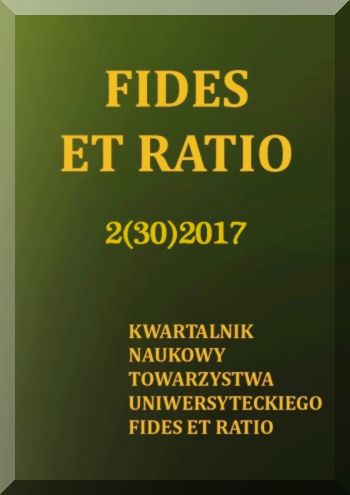Abstrakt
The article includes a comparison of Apology of Socrates with 1 Corinthians 1-4, finding motifs common to both works. Here, a similarity in the concept of deity was indicated. Attention was also drawn to the supernatural vocation of St. Paul and Socrates. Their lack of fear of death was accentuation. It is shown that both of them proposed a new system of thought, which led to a persecution for new ideas.
1 Corinthians 1-4 and Apology of Socrates became apologies of their heroes, in the answer to charges against them. Their father-fraternal relationship to the audience was unique, in comparison, to other works. Both of them pointed to the divine source of wisdom and clearly indicated the difference between divine and human wisdom. Most importantly, in both works there appears a creation a seemingly helpless figure, who, paradoxically, through the apparent lack of rhetorical skill excellently presents his ideas. This article is a good starting point for further comparative studies of New Testament with Greek classical works.
Bibliografia
Brookins T. (2010), Corinthian Wisdom, Stoic Philosophy and the Ancient Economy, Neotestamentica, nr 2 (44), s. 232-252.
Captatio, (1998), (w:) Słownik łacińsko-polski, M. Plezia (red.), t. I, Warszawa: PWN,
s. 432.
Inkelaar H.J., (2011), Conflict over Wisdom. The Theme of 1 Corinthians 1-4 Rooted in Scripture, Leuven-Paris-Walpole: Peeters.
Jankowski A., K. Romaniuk, L. Stachowiak, (1999), Komentarz praktyczny do Nowego Testamentu, t. I, Poznań-Kraków: Pallotinum.
Jelonek T., (2012), Kultura grecka a Nowy Testament, Kraków: Petrus.
Jipp J.W., (2002), Paul’s Areopagus Speech of Acts 17:16-34 as Both Critique and Propaganda, Journal of Biblical Literature, nr 3 (131), s. 567-575.
Karłowicz D., (2005) Sokrates i inni święci, Warszawa: Fronda Ośrodek Myśli Politycznej.
Keener C.S., (2000), Komentarz historyczno-kulturowy do Nowego Testamentu, Warszawa: Vocatio.
Kondo K., (2014), Socrates’ Rhetorical Strategy in Plato’s Apology, Athens, (http://www.atiner.gr/papers/PHI2014-0960.pdf, 4 maja 2016).
Legutko R., (2013), Sokrates. Filozofia męża sprawiedliwego, Poznań: Zysk i S-ka.
MacDonald D. R., (2015), Luke and Vergil: Imitations of classical Greek Literature, Lanham [i in.]: Rowman & Littlefield.
Marguerat D., (2013), Paul in Acts and Paul in His Letters, Tübingen: Mohr Siebeck.
Martin H. M., (1992), Areopagus, (w:) Anchor Bible Dictionary, D.N. Freedman (red.),
t. I, New Yoirk: Doubleday, s. 370-371.
Najda J., (2009), Święty Paweł a areopagi współczesności, Roczniki Teologii Katolickiej, nr 8, s. 98-111.
Novum Testamentum Greace, (2014), Stuttgart : Deutsche Bibelgesellschaft, wyd. 28
E. & E. Nestle, B. & K. Aland (wyd.).
Penna R., (2008), Święty Paweł z Tarsu, Kraków: OO. Franciszkanów „Bratni Zew”.
Platon, (2002), Obrona Sokratesa, tł. R. Legutko, Kraków: OMP.
Platon, (2007), Obrona Sokratesa, tł. W. Witwicki, Kęty: PWN.
Reis D. M., (2002), The Areopagus as Echo Chamber: Mimesis and Intertextuality in Acts, Journal of Higher Criticism, nr 9, s. 259-277.
Romaniuk K., (1995), Św. Paweł. Życie i dzieło, Katowice: Księgarnia Świętego Jacka.
Rowe C. K., (2010), The Grammar of Life: The Areopagus Speech and Pagan Tradition, New Testament Studies, nr 57, s. 31-39.
Sikora A., (1975), Spotkania z filozofią, Warszawa: Iskry.
Smith N. D., (1998), Wisdom, (w:) Routledge Encyclopedia of Philosophy, E. Craig (red.),
t. IX, London-New York: Routledge, s. 753-755.
Sutton S. B., (1999), Greeks, (w:) Cultures of the Word, M. Ember, C. R. Ember (red.), New York, s. 424.
Vanhoye A., (2009), Charakter Pawła Apostoła, Pastores, nr 2, s. 27-34.
Wiśniewski R., (2002), Szkoły hellenistyczne, (w:) Historia filozofii i etyki do współczesności, W. Tyburski, R. Wiśniewski, A. Wachowiak (red.), Toruń: Towarzystwo Naukowe Organizacji i Kierownictwa „Dom Organizatora”,
s. 97-114.
Wittkowsky V., (2005), Warum zitieren frühchristliche Autoren pagane Texte?, Berlin: De Gruyter,.
Wojciechowski M., (2012), Wpływy greckie w Biblii, Kraków: WAM.
